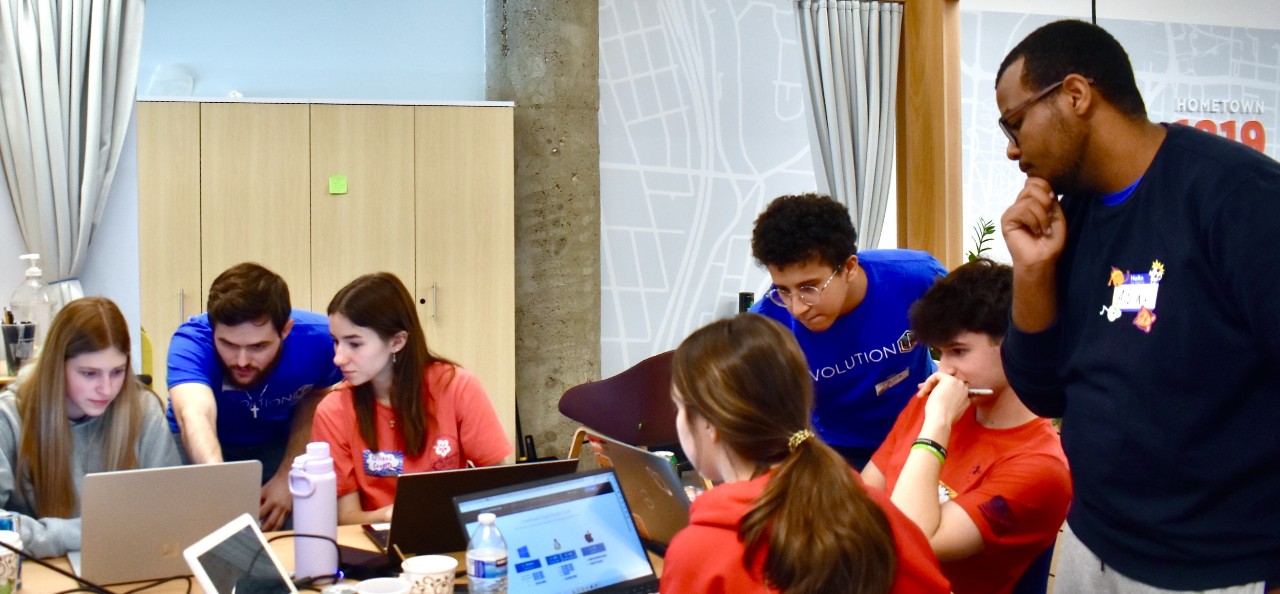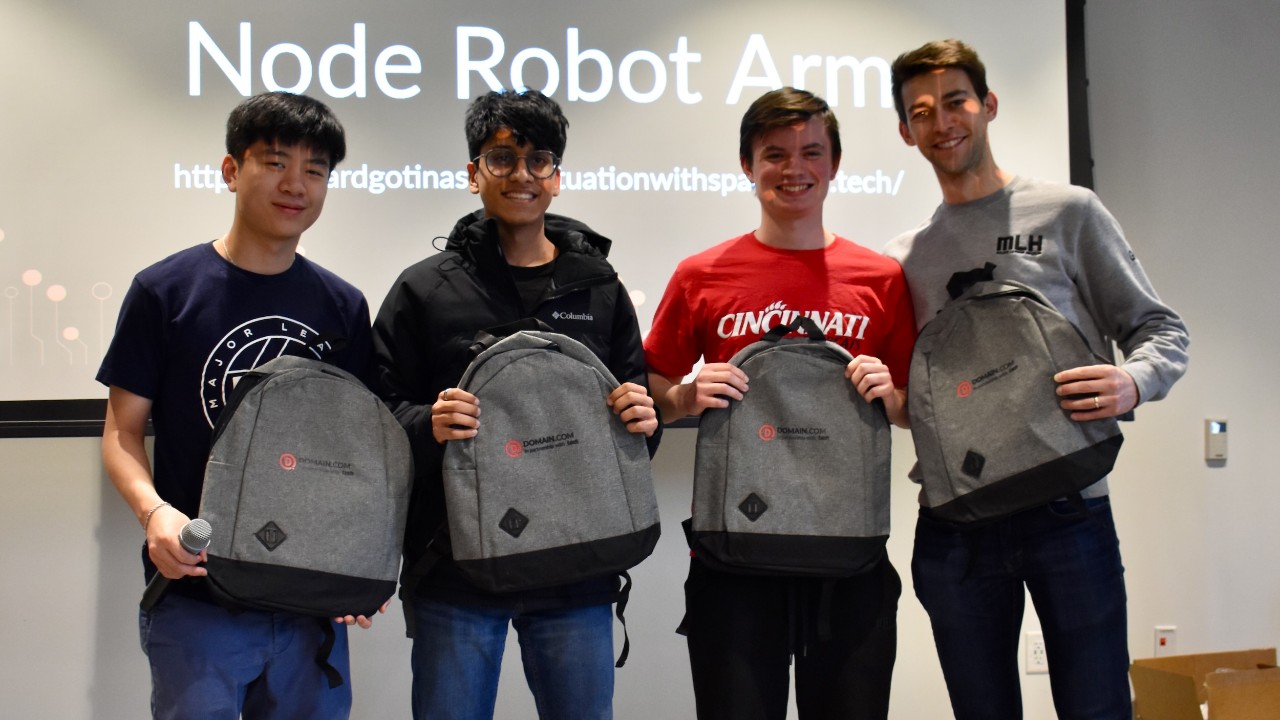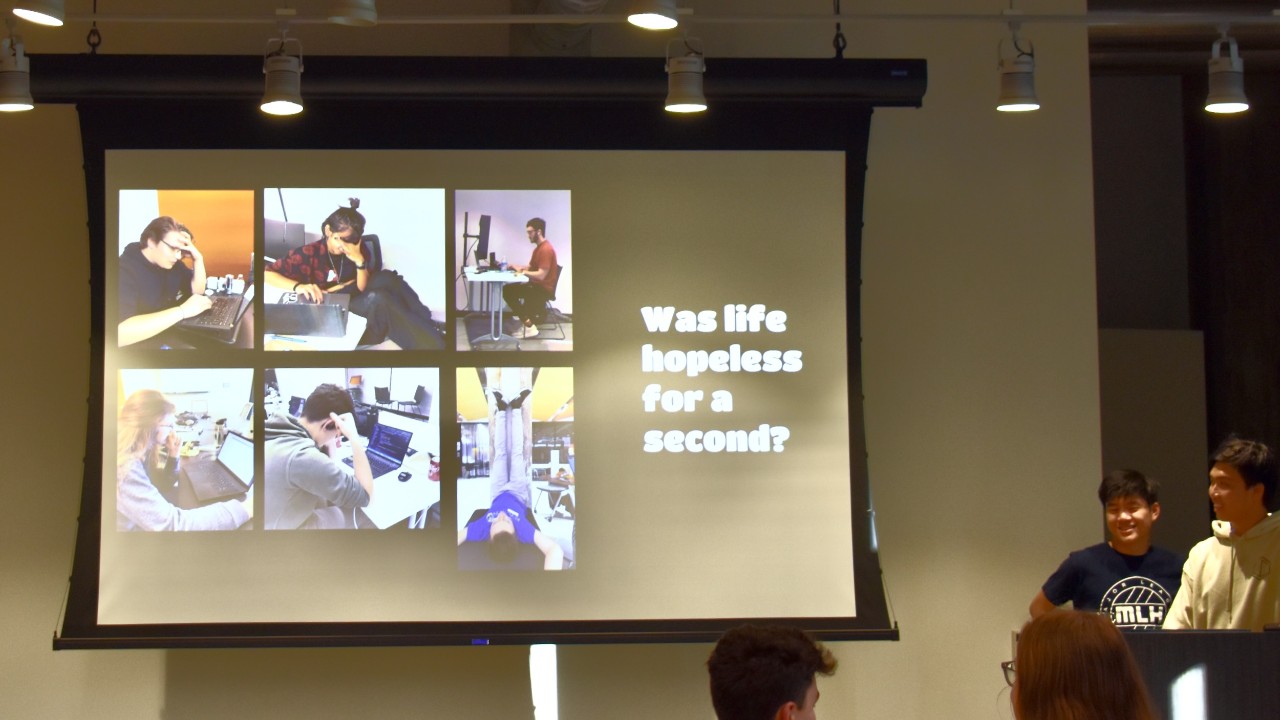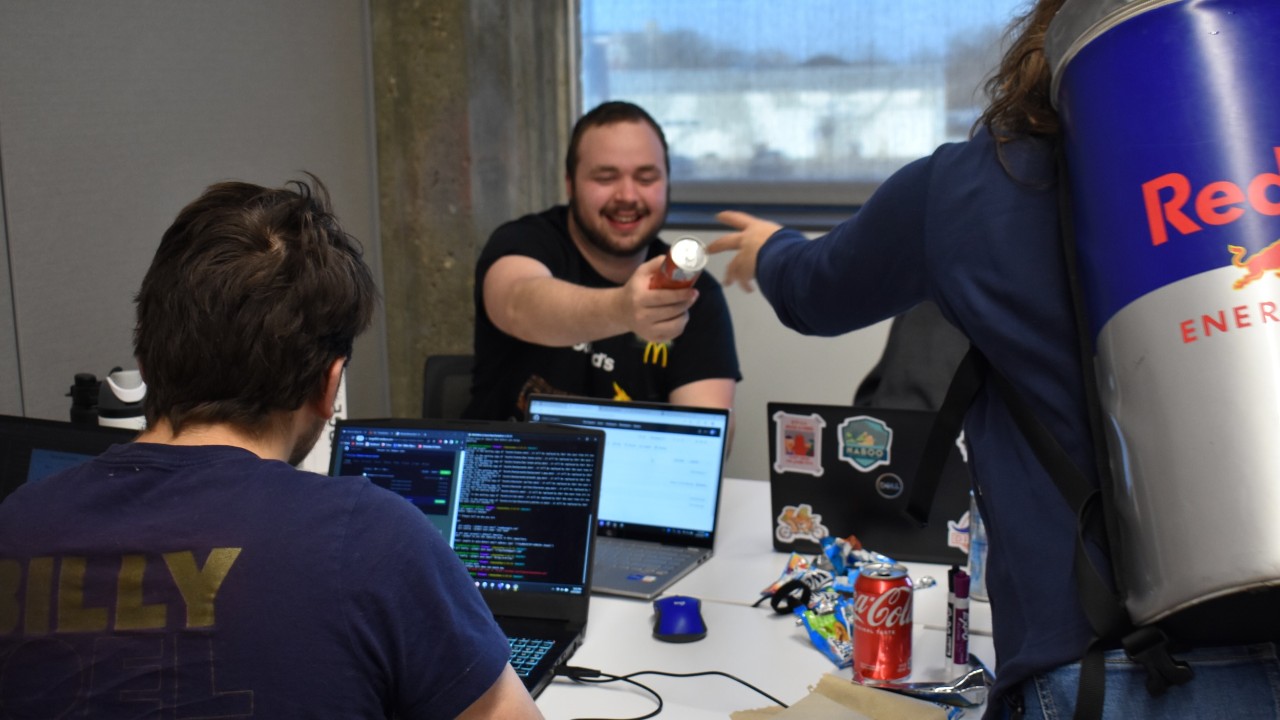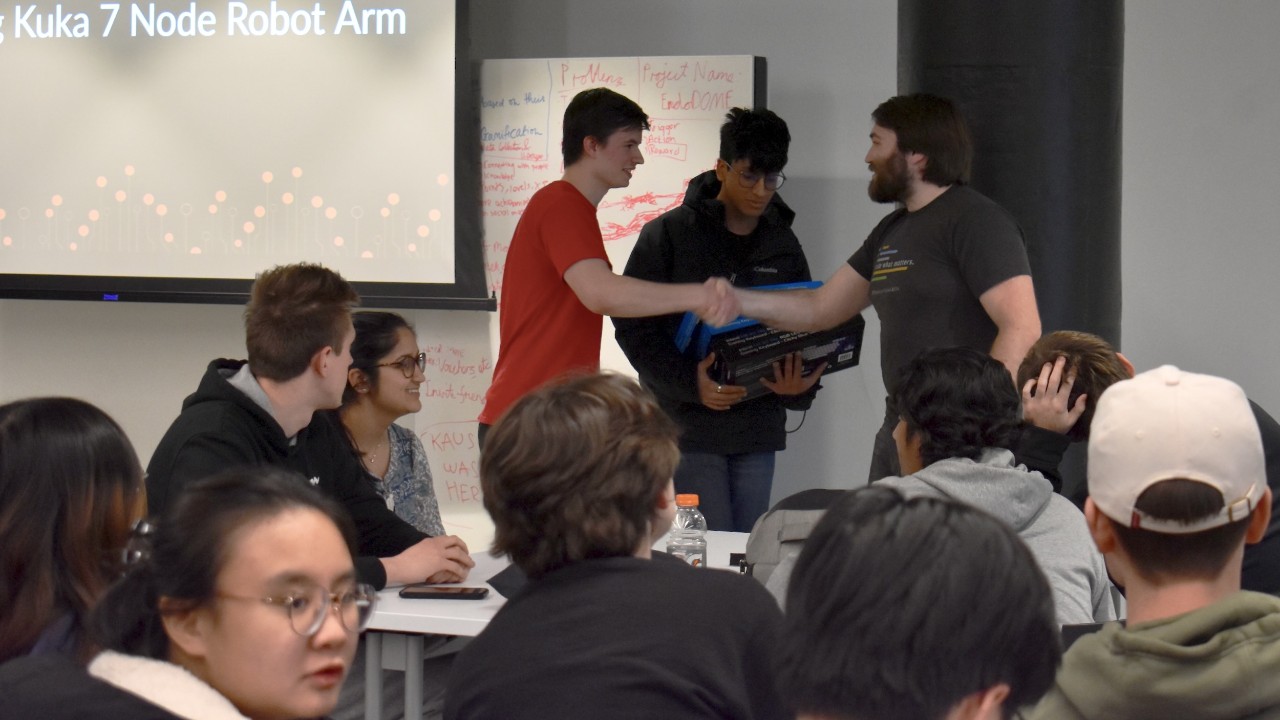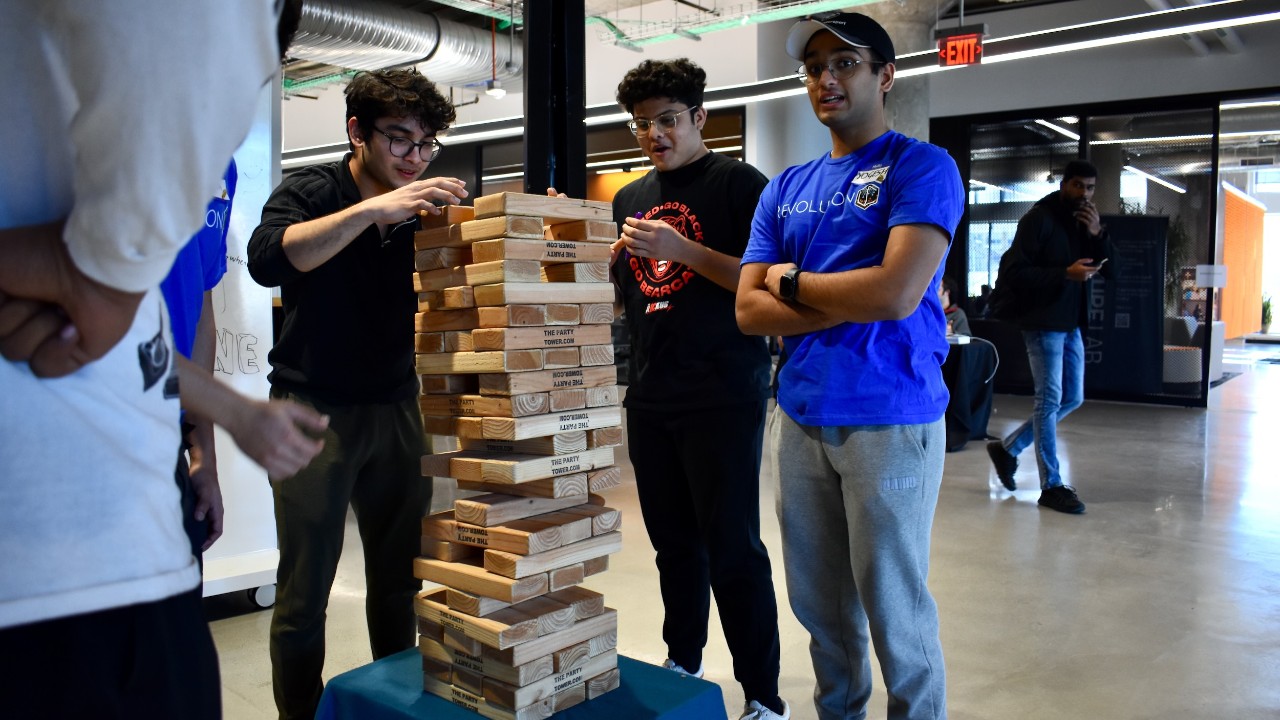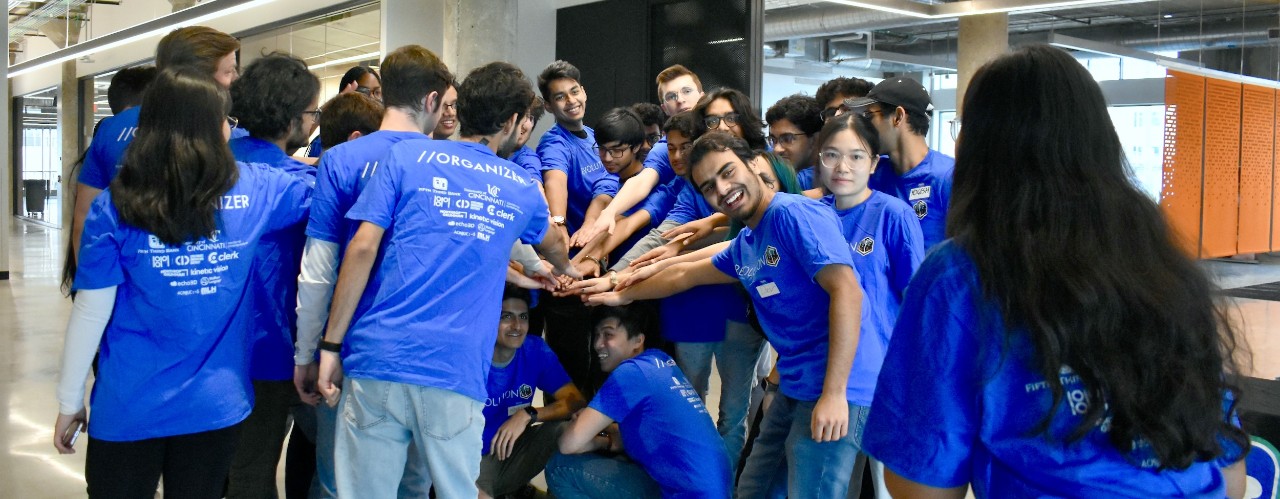
Weekend hackers invade UC
RevolutionUC — powered by hackers, focused on innovation, fueled by memes
The University of Cincinnati’s 1819 Innovation Hub buzzed with energy over the weekend as around 200 college and high school students from across the Midwest came together to solve problems and create solutions.
As part of the RevolutionUC 11th annual hackathon, students from 50 schools convened with industry leaders for a weekend of code, community and self-improvement.
Supported by UC’s Center for Entrepreneurship and 1819 Innovation Hub corporate partners, the hybrid event hosted 150 students in house and another 50 who were tuned in online. Participants from diverse educational backgrounds and interests worked together in teams of friends, old and new, to design unique and innovative websites, mobile apps, bots and hardware hacks — all with the goal of creating sustainable, life-improving technologies.
“These hackathons are a great way to connect students with our corporate and ecosystem partners,” said Kate Harmon, assistant vice president in the 1819 Innovation Hub and executive director of the UC Center for Entrepreneurship. “We’re here to help students and entrepreneurs get their ideas off the ground and build scalable startups right here in Cincinnati.”
New to hackathons? No problem!
Over the course of 24 hours, experienced business mentors helped more than 40 student teams dive into the fantastical community of tech innovation.
“You’re all going to approach solving a problem from very different angles, and you’re going to have different ideas on how to solve those things,” said Nate Sowder, ecosystem innovation manager for the Fifth Third Bank. “You’ll learn as you work together that you are all approaching seemingly the same subject from very different perspectives.
“How that diversity of thought leads to the best solution is the essence of innovation.”
What is RevolutionUC?
For more than a decade, the CEAS student-led event has been building greater momentum for the Cincinnati tech community. Each year, RevolutionUC connects passionate techies so they can build new things, learn new things and grow as hackers.
Let’s hack something together
Unlike competitive hackathons, RevolutionUC encouraged the all-inclusive student teams to share their passion for building, learning and growing while creating something helpful and sustainable — whether it’s environmental, social or financial.
Hack ideas included health care apps, cyber security safety and helpful community and social sites. Open to all skill levels, RevolutionUC tapped into helpful resources for even the most novice hackers.
While teams came up with tech ideas on their own, industry mentors suggested helpful massive open online courses (MOOCs) and pointed to resources such as YouTube videos, starter-kit demos and other free online sites to help launch their ideas into digital products.
During 24 hours of workshops and brainstorming, moments of comic relief broke the tension with relaxing activities such as a Bob Ross digital painting event, video gaming in the Esports Lab and a paper airplane competition.
Thinking INSIDE the box
During the closing ceremony, three teams rose to the top.
The third-place team, aptly titled Highway Harmony — a three-person UC team, including two first time hackers — developed a unique program that provides a fairer Spotify shared music playlist for road trips.
The team winning second overall was Parkinson’s Companion. Based on a UC student nonprofit of the same name, the team created a tool that enables patients with Parkinson's disease to check in through Alexa to review medications and exercises with their physicians on a day-to-day basis.
Topping the event in first place was Tone In, a digital tool to help users better navigate the often complex and diverse environment of Slack, a business messaging app that organizes conversations into channels.
“We recognized that users could find it challenging to gauge the tone of a conversation, particularly in busy channels or workspaces with new members constantly joining,” said Finn Bledsoe, one of the Tone In team members and a second-year computer science student and software developer at Berea College in Kentucky. “We also wanted to provide administrators with a tool to indicate the level of formality of their channels to users.”
While each team of hackers came to their environmental, social and governance ideas from very different angles of necessity and interest, the students said they used this diverse approach to work toward a winning solution — now that’s innovative success!
And, it's a wrap
Featured image at top: RevolutionUC student-led event in UC's 1819 Innovation Hub. All photos by Atherva Patil/RevolutionUC
Impact Lives Here
The University of Cincinnati is leading public urban universities into a new era of innovation and impact. Our faculty, staff and students are saving lives, changing outcomes and bending the future in our city's direction. Next Lives Here.
Related Stories
Weekend hackers invade UC
March 6, 2023
The University of Cincinnati’s 1819 Innovation Hub buzzed with energy over the weekend as around 200 college and high school students from across the Midwest came together to solve problems and create solutions. As part of the 11th annual RevolutionUC hackathon, students from 50 schools convened with industry leaders for a weekend of code, community and self-improvement.
From lab to legacy inside UC’s 1819 Innovation Hub
December 12, 2023
In the vibrant corridors of the University of Cincinnati, pioneering research extends beyond the confines of laboratories — it launches revolutionary ideas poised to reshape the world. The key to safeguarding these innovations lies in the swift and savvy journey through the 1819 Innovation Hub’s technology transfer and patent licensing process, a vital approach for both faculty and the university.
Spring break renaissance: Makerspace becomes haven for innovation
April 1, 2024
During spring break, the University of Cincinnati's 1819 Innovation Hub Makerspace is typically a ghost town. After opening the space during "Maker Break," UC faculty and students populated the 12,000-square-foot prototyping and fabrication haven in a win-win opportunity, acquiring machine certification and the time to complete their senior capstone and passion projects.

